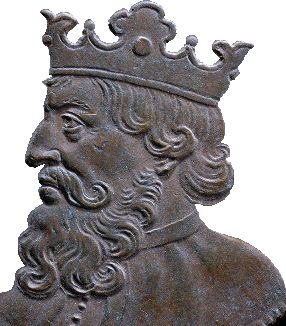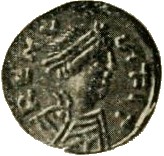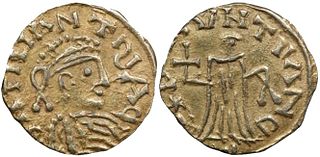
Charles Martel or Charles the Hammer was a Frankish political and military leader who, as Duke and Prince of the Franks and Mayor of the Palace, was the de facto ruler of Francia from 718 until his death. He was a son of the Frankish statesman Pepin of Herstal and Pepin's mistress, a noblewoman named Alpaida. Charles, also known as "The Hammer", successfully asserted his claims to power as successor to his father as the power behind the throne in Frankish politics. Continuing and building on his father's work, he restored centralized government in Francia and began the series of military campaigns that re-established the Franks as the undisputed masters of all Gaul. According to a near-contemporary source, the Liber Historiae Francorum, Charles was "a warrior who was uncommonly ... effective in battle".
The 580s decade ran from January 1, 580, to December 31, 589.

Year 590 (DXC) was a common year starting on Sunday of the Julian calendar. The denomination 590 for this year has been used since the early medieval period, when the Anno Domini calendar era became the prevalent method in Europe for naming years.

Chlothar II, sometime called "the Young", was king of Neustria and king of the Franks, and the son of Chilperic I and his third wife, Fredegund. He started his reign as an infant under the regency of his mother, who was in an uneasy alliance with Chlothar's uncle King Guntram of Burgundy, who died in 592. Chlothar took power upon the death of his mother in 597; though rich, Neustria was one of the smallest portions of Francia. He continued his mother's feud with Queen Brunhilda with equal viciousness and bloodshed, finally achieving her execution in an especially brutal manner in 613, after winning the battle that enabled Chlothar to unite Francia under his rule. Like his father, he built up his territories by seizing lands after the deaths of other kings.

Chilperic I was the king of Neustria from 561 to his death. He was one of the sons of the Frankish king Clotaire I and Queen Aregund.

Chlothar I, sometime called "the Old", also anglicised as Clotaire, was a king of the Franks of the Merovingian dynasty and one of the four sons of Clovis I.

Childebert II (c.570–596) was the Merovingian king of Austrasia from 575 until his death in March 596, as the only son of Sigebert I and Brunhilda of Austrasia; and the king of Burgundy from 592 to his death, as the adopted son of his uncle Guntram.

Francia, also called the Kingdom of the Franks, Frankish Kingdom, Frankland or Frankish Empire, was the largest post-Roman barbarian kingdom in Western Europe. It was ruled by the Frankish Merovingian and Carolingian dynasties during the Early Middle Ages. Francia was among the last surviving Germanic kingdoms from the Migration Period era.

Sigebert I was a Frankish king of Austrasia from the death of his father in 561 to his own death. He was the third surviving son out of four of Clotaire I and Ingund. His reign found him mostly occupied with a successful civil war against his half-brother, Chilperic.
Fredegund or Fredegunda was the Queen consort of Chilperic I, the Merovingian Frankish king of Soissons. Fredegund served as regent during the minority of her son Chlothar II from 584 until 597.

Charibert I was the Merovingian King of Paris, the second-eldest son of Chlothar I and his first wife Ingund. His elder brother Gunthar died sometime before their father's death. He shared in the partition of the Frankish kingdom that followed his father's death in 561, receiving the old kingdom of Childebert I, with its capital at Paris.

Saint Gontrand, also called Gontran, Gontram, Guntram, Gunthram, Gunthchramn, and Guntramnus, was the king of the Kingdom of Orléans from AD 561 to AD 592. He was the third-eldest and second-eldest-surviving son of Chlothar I and Ingunda. On his father's death in 561, he became king of a fourth of the Kingdom of the Franks, and made his capital at Orléans. The name "Gontrand" denotes "War Raven".

Nominoe or Nomenoe was the first Duke of Brittany from 846 to his death. He is the Breton pater patriae and to Breton nationalists he is known as Tad ar Vro.
Brunhilda was queen consort of Austrasia, part of Francia, by marriage to the Merovingian king Sigebert I of Austrasia, and regent for her son, grandson and great-grandson.

Gundoald or Gundovald was a Merovingian usurper king in the area of southern Gaul in either 584 or 585. He claimed to be an illegitimate son of Chlothar I and, with the financial support of the Emperor Maurice, took some major cities in southern Gaul, such as Poitiers and Toulouse, which belonged to Guntram, king of Burgundy, a legitimate son of Chlothar I. Guntram marched against him, calling him nothing more than a miller's son and named him 'Ballomer'. Gundovald fled to Comminges and Guntram's army set down to besiege the citadel. The siege was successful, Gundovald's support drained away quickly and he was handed over by the besieged to be executed.

Judicael or Judicaël (Welsh:Ithel), also spelled Judhael, was the King of Domnonée, part of Brittany, in the mid-7th century and later revered as a Roman Catholic saint.
Berengar II was the Count of Bayeux and Rennes and Margrave of the Northern or Norman March from 886 until his death a decade later.
Desiderius was a Gallo-Roman dux in the Kingdom of the Franks during the reigns of Chilperic I and Guntram. He served Chilperic as Duke of Aquitaine and was his greatest general.

Gwened, Bro-Gwened or Vannetais is a historic realm and county of Brittany in France. It is considered part of Lower Brittany.
Count of Vannes was the title held by the rulers of the County of Vannes.